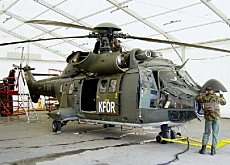
Israeli arms deal catches flak

The Swiss defence ministry has been criticised by an anti-war group and the Green Party for striking a new deal to buy military hardware from Israel.
Both the Group for Switzerland without an Army and the Greens have repeatedly urged the government to scrap military collaboration with Israel and other Middle East countries.
On Sunday the defence ministry confirmed a report in the SonntagsZeitung newspaper that Switzerland would be buying equipment from Israel for its Super Puma helicopters. The material, valued at SFr4-10 million ($3-8 million), is needed to modernise cockpits.
According to spokesman Martin Bühler, the deal represents less than one per cent of the military procurement budget for 2006.
The Group for Switzerland without an Army, which is also trying to block the purchase of a SFr395-million Israeli communications system, condemned the move.
“While there is no longer open conflict in Lebanon, there is little evidence of lasting peace in the region and the risk remains of future conflicts,” the organisation’s secretary Reto Moosmann told swissinfo. “We are absolutely against imports and exports of military material with any Middle East country.”
During the conflict in Lebanon the anti-war group and the Green party demanded an immediate suspension of arms deals with Israel.
These were revived by the defence ministry in February 2005 – after a three-year hiatus – on the basis of “positive developments” in the Middle East.
The foreign ministry elected to take no action because the conflict was between Israel and Hezbollah, and not two states.
Green Party parliamentarian Josef Lang told swissinfo he was “very unhappy” that the defence ministry was continuing to buy military material from Israel.
The Greens plan to table a series of objections about Switzerland’s military procurement programme at a meeting of parliament’s security commission later this month.
Visit cancelled
Sunday’s announcement comes less than two months after it was revealed that Defence Minister Samuel Schmid had blocked a visit to Israel in December by the head of the Swiss Land Forces, Corps Commander Luc Fellay. The decision was taken while fighting was still going on in Lebanon.
The trip, planned from December 2-5, was aimed at gathering information about artillery and electronic warfare.
At the time Schmid said in an interview with Le Matin Dimanche that military cooperation between Switzerland and Israel “was not so great as to warrant being suspended”.
“We do not export [arms to Israel] and the import of Israeli military material is extremely modest and in our interest,” he told the newspaper.
Schmid noted that imports of Israeli military equipment were valued at about SFr40 million (SFr31.4 million) for 2006.
He also said there was no question of cancelling the traditional annual meeting of Swiss and Israeli army officers due to take place in Switzerland in November.
swissinfo with agencies

More
Green Party
Switzerland reduced its military cooperation with Israel in 2002 after Israeli occupation of towns on the West Bank.
This picked up again in the spring of 2005 with a Swiss order for the SFr395 million Integrated Radio Reconnaissance and Transmissions System (IFASS), designed by an Israeli electronics company.
Swiss-Israeli military collaboration is not limited to the IFASS system. The Swiss firms Ruag (which is owned by the government) and Oerlikon Contraves have developed with Israeli company IAI ELTA Systems a small radio-controlled surveillance drone.

In compliance with the JTI standards
More: SWI swissinfo.ch certified by the Journalism Trust Initiative






























You can find an overview of ongoing debates with our journalists here . Please join us!
If you want to start a conversation about a topic raised in this article or want to report factual errors, email us at english@swissinfo.ch.